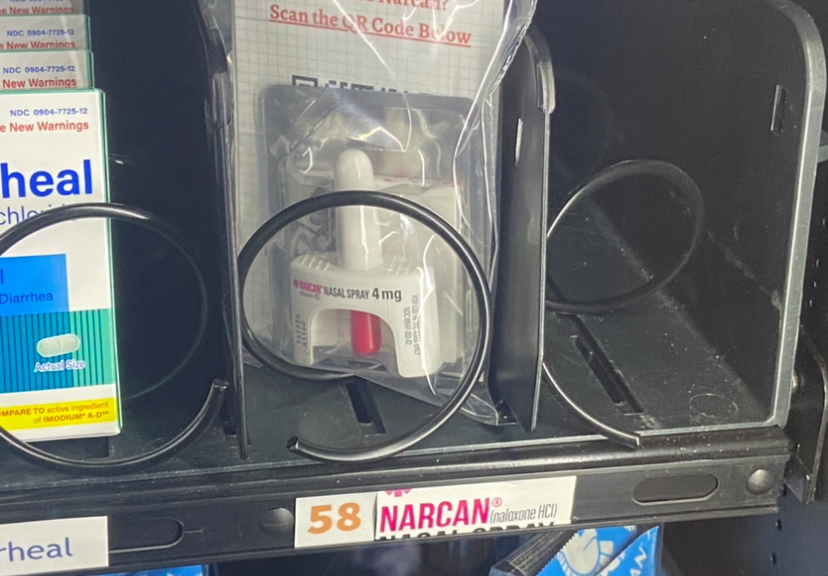‘Lifesaver’ drug Narcan now available at three campus locations free of charge
Narcan, a drug that can help reverse opioid overdose, is seen in a vending machine at the Ikenberry Commons.
December 5, 2022
In a Massmail sent out on Nov. 29, McKinley Health Center Director Awais Vaid announced that Narcan, a drug that can help reverse opioid overdose, would be available for free at three campus locations.
Narcan will be available at the McKinley Health Center pharmacy as well as the Illini Union and a vending machine at Ikenberry Hall.
Vaid said that the Champaign-Urbana Public Health District provided about 100 doses of Narcan to the campus, free of charge.
“I come from the public health world,” Vaid said. “I know dozens of stories of family members and friends who are able to reverse opioid overdose because they had something on hand. I used to hear these stories all the time. And that’s why I think it was important for me to make sure this was available and accessible to the campus community.”
CUPHD, according to Vaid, has been distributing Narcan in Central Illinois through a state and federal grant, and has been making a push for many years to try to get the drug into the “hands of as many people as possible.”
Get The Daily Illini in your inbox!
Narcan is also available to anybody who goes to the CUPHD, and the University of Illinois Police Department also has access to it.
Vaid said there were about 41 deaths because of opioid overdose in Champaign county in 2021.
“And just this year, and the year is not even over, there have been at least 20, maybe 25 deaths in the county,” Vaid added.
Vaid said that, although he cannot pinpoint the exact locations of where these deaths occurred, many of the deaths were surrounding the campus community.
“So it is likely, although we don’t have any documentation that any of those deaths were University of Illinois affiliated faculty, staff or students, but it could be that you know, people know somebody, a neighbor, a roommate or a friend, who was one of those that have died because of overdose,” Vaid said.
Vaid said making Narcan available to a lot of people is “a lifesaver.”
“In an emergency, it takes five to seven minutes, even after you call 911 for first responders to respond,” Vaid said. “So having Narcan in the hands of people that can easily identify overdose, or know somebody in their family, friends or roommates in their friend circle … to have it easily accessible was life-saving and life-changing.”
The Massmail also mentioned that distribution programs “have been proven to show a reduction in overdoses demonstrating positive results.”
Naloxone (the generic name of the drug) distribution program in Massachusetts decreased opioid overdose deaths by an estimated level of 11 percent and did not raise use of opioids in 19 communities in which the program was conducted, according to a study cited by the National Institute on Drug Abuse.
The primary form of the drug being offered on campus is the nasal version, as opposed to the injection, because the nasal form is easier to use, according to Vaid.
“It doesn’t need any training to be able to administer, it’s pretty much you know, a spray just like you would take something for your allergies,” Vaid said. “Just put it on your nose and pump it. That’s it.”
Vaid also offered a brief explanation of how Narcan, known as an opioid “antagonist,” works.
“What it does is it basically competes with the opioid receptors, and removes the opioid from the receptors where they’re sitting and trying to depress your breathing,” Vaid said. “It immediately fights with the opioids to remove them from the receptors of the brain, and the breathing starts back immediately.”
Someone that takes the drug could go through an immediate “withdrawal” once the effects of the opioid in question are removed.
“A little agitated, angry, throwing up as well,” Vaid said.
Vaid was also adamant that Narcan is not a full treatment, and that 911 should be called immediately in such an event.
Students will be allowed access to the drug only once per semester, according to the Massmail.
The Massmail also asks recipients to “please only access a dose if you feel it may be used,” in an effort to make sure as many people in the campus community have access to the drug.
“We want this to be taken by individuals, who themselves, use opioids,” Vaid said. “Or if you have a friend or a family member that is taking either a prescription opioid, or a non-prescription version of it, and they’re using it, it would be a good idea to have this handy.”







